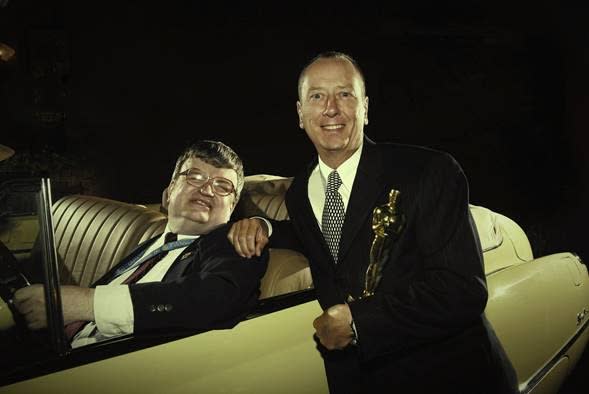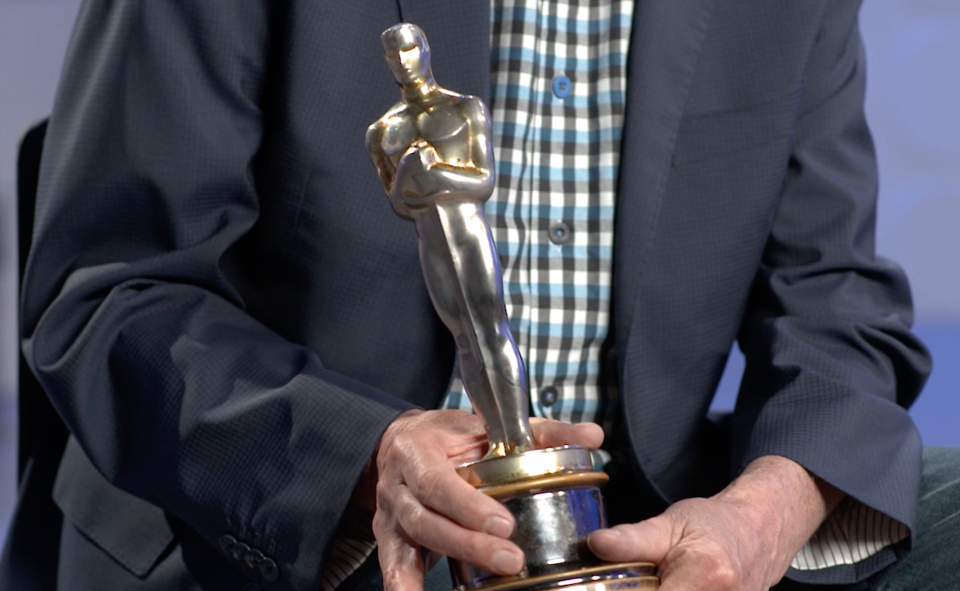The touching story behind why the 'Rain Man' writer gave up his Oscar to raise autism awareness
Most Oscar winners keep their statuette. In a trophy case. Or a safe. Or maybe even as an ornamental toilet-roll holder. Point being, to separate the sought-after prize from its owner is highly difficult and, as Frances McDormand recently proved, usually due to criminal activity. Rarely is Oscar voluntarily given up.
Barry Morrow, the Oscar-winning screenwriter of Rain Man, is the exception. After winning for Best Original Screenplay at the 61st Academy Awards in 1989 (with Ronald Bass), Morrow relinquished his award to his friend Kim Peek. Peek was Morrow’s inspiration for Dustin Hoffman’s character in the film, Raymond Babbitt, and was known as a megasavant: part human calculator, part encyclopedia, part historical calendar. But those abilities came at the expense of underdeveloped social and motor skills.
At first, Peek was thought to be autistic. And although that was later debunked, Raymond Babbitt and Rain Man introduced the world to autism.
With April being Autism Awareness Month, Morrow spoke to Yahoo Entertainment about his Oscar’s unique journey around the world and the legacy of his iconic movie.
On the big night, Peek watched Rain Man’s many wins on TV (it also nabbed Best Picture, Best Director, and Best Actor for Hoffman), but it wasn’t until nine months later, when he and his father, Fran, visited Morrow, that Kim actually met Oscar.

“He asked if he could hold it, and I said, ‘Kim without you, there wouldn’t be an Oscar,’” Morrow recounted. “He carried it around with him all day. He didn’t carry it [upright] like you do; he carried it like you would an infant.”
After a jam-packed day of activities — all featuring Kim carrying baby Oscar — it was time to go. “I saw in his eyes that he loved this thing,” said Morrow. “So I said, ‘Keep it, take it with you, this Oscar needs you.’”

For two decades, Morrow’s Oscar toured with Kim and his father as they spoke across the country, simultaneously dazzling audiences with Kim’s vast knowledge (he could recall people’s phone numbers from memorizing phone books) and normalizing those with autism and savant syndrome. This post-Rain Man tour was even a boon to Kim’s confidence, and he grew to enjoy these interactions.
Also, with every visit, the duo let curious audience members touch the Rain Man Oscar. Over the years touring with the Peeks, it was held by an estimated 400,000 people, earning it the nickname of “the world’s best-loved Oscar.”
After being held by another nearly 600,000 people on its continuing travels, the Rain Man Oscar has had almost all its gold rubbed off. It’s also slightly askew after being dropped.

“When Kim died [in 2009], they wanted to give it back to me,” said Morrow. “And by that time I had gotten used to not having it and said, ‘No, let’s make this part of a memorial.’”
Morrow ended up gifting his Oscar to the state of Utah (where the Peeks lived), and eventually the Utah Film Center even created a Peek Award, which pays “tribute to artists, media makers, and film subjects who are positively impacting our society’s perception of people with disabilities.”
While Rain Man was both critically and commercially successful, some critics have said the movie misrepresents autistic people. Morrow addressed that perception.
“There are a lot of misunderstandings about autism, and some of them resulted from Rain Man,” said Morrow. “Not every autistic person is a savant, and not every savant is autistic. And I read some of the blogs, and sometimes they’ll complain about Rain Man, ‘Oh, that was so stereotypical.’ But as others have pointed out, Rain Man was the prototype; [before that] there was nothing. There’s no way a character can represent the full spectrum of autism or savant syndrome. I just met Kim.”

Long after Kim’s passing, his treasured possession is still continuing its impressive tour. “It’s spent the last year traveling in China,” Morrow said. Morrow has traveled to China for 20-some years and has noticed a dearth of awareness about autism. So, he started a nonprofit foundation with the hopes of remedying that. “I thought, ‘Maybe I can make a mark in China,’” he said. “It’s kind of my way of saying thank you [to] Kim, Rain Man, the whole journey.”
He continued, “At some point we’ll have had a million people who have held this Oscar, not because it’s an Oscar but because it represents something more than a movie.”
In fact, the “best-loved Oscar” is now affecting those who haven’t always been given the same amount of care and affection. Morrow said, “Families with children, and adults, with autism haven’t always been loved and appreciated. This says, to them, that we are [appreciating you]. That’s what this ‘little golden boy,’ as it’s called in China, represents. It’s about autism and it’s about a movement, and Oscar is a really good rep for this.”
Read more from Yahoo Entertainment:


